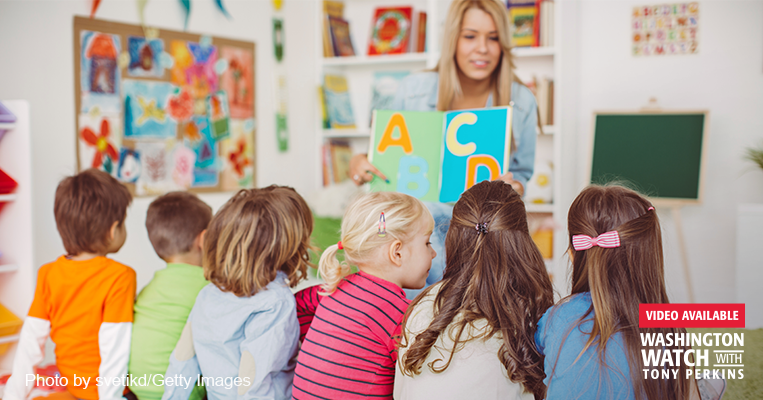By Tony Perkins
It’s one thing to assume a Leftist policy is bad — and another thing to know for sure it is. That’s the interesting situation the White House finds itself in now that another study has just blown an enormous hole in Biden’s government-run pre-K plan. The $390 billion dollar proposal is based on a failed model, experts keep saying. Now, after a study of 3,000 students, we’ll see if the Democrats are listening. If they don’t, it’s because they have one thing on their minds — and it’s not education. It’s indoctrination.
Psychology Today’s Hara Estroff Marano took one look at the paper from Vanderbilt and was convinced, “If President Biden’s plan for universal state-run preschool for three- and four-year-olds is approved, the results could be disastrous.” That’s not news to the education community, who had a front-row seat for the disastrous years of Head Start — an early education program that was such a failure even Barack Obama’s HHS admitted it.
Now, a decade later, Joe Biden wants to reboot the idea under the American Families Plan, a “free” daycare system that would give radical Leftists an even earlier grip on our children. But for a party who supposedly cares so much about “the science,” they certainly don’t give a fig here. After years of government-run Pre-K attempts, 2022 data says it’s a bust. It’s certainly no comparison to an institution that costs taxpayers nothing: the intact family.
Still, certain states have been game to try it, launching pre-K programs with the best of intentions. In Tennessee, a lot of effort went into creating a program that would give underprivileged kids a jump-start on their schooling. “The National Institute for Early Education Research (NIEER) evaluated the curriculum early on and judged it to be among the best,” Marano explained. It included five and a half hours of “instructional time” from highly-qualified teachers five days a week. Researchers decided the idea was so well constructed that they would study the idea’s impact.
Years later, Marano says, if their findings don’t “put a nail in the coffin of academic training to little children, it’s hard to imagine what will.” Although the pre-K group performed better than their control group peers (who weren’t sitting through hours of classes every day) in kindergarten, “the control group soon caught up and, by the third grade, the control group performed better on all academic measures than the pre-K group.” Worse, the Vanderbilt team found, by the third grade, the kids in the pre-K group were “significantly more likely to have been diagnosed with a learning disorder and [unruly conduct]…” And that gulf only continued to widen.
Dr. Katharine Stevens, founder and CEO of the Center on Child and Family Policy, argues that no one should be surprised. These findings, she explained on “Washington Watch,” “are consistent with what we would expect given what we know about early human development — which is that a school environment, a group institutional setting is not optimal for early childhood development.” Not only did the program not help these pre-K children in their later educational experience, Stevens argues, “it seems to have hurt them.”
“There’s nothing in developmental science that suggests putting four-year-olds or three-year-olds or even younger children in group institutional settings is what they need to develop.” In fact, she points out, “up until the mid-1960s, the public schools were [where] kids went to learn basic skills… reading, writing, arithmetic.” It was all very intentional. “Lyndon Johnson was the first to suggest that the public schools would be the vehicle for upward mobility in our society, that public schools would solve poverty.” Now, Stevens says, we’ve come to “equate human development with schooling. We never used to think that — not for all of human history. And that’s become such a binding way of thinking.” At the end of the day, “we are confusing early development with early school — and the outcome of that could be disastrous for the children and for the nation.”
And yet, Democrats like Senator Elizabeth Warren (D-Mass.) and so many others continue to call proposals like Biden’s a “win-win-win.” Maybe that’s true for the far-Left crowd, who’s been successfully passing off radical agendas like “education” to younger and younger children for years. Only now, parents have caught on — and most of them probably aren’t eager to put their kids in the state’s indoctrination any sooner.
If there’s one thing remote-learning families have figured out, it’s that the government isn’t interested in teaching your child — it’s interested in brainwashing them on history, race, gender, and sexuality. So while Biden may say he wants to make a “once-in-a-generation investment” into our children, more families will see it for what the program really is: a once-in-a-generation opportunity to get more kids away from parents and into a government-controlled environment.
















